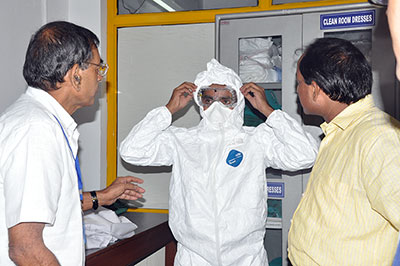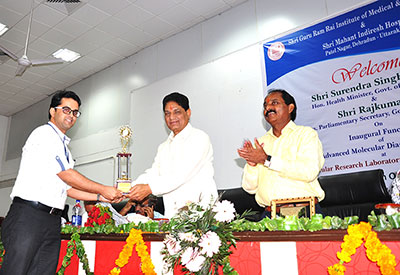Central Molecular Research Laboratory (CMRL)
Biochemistry Department
Cellular & Molecular Research Training Programs (CMRTP)
 Central Molecular Research Laboratory (CMRL): Central Molecular Research Laboratory (CMRL) at Shri Guru Ram Rai Institute of Medical & Health Sciences, Patel Nagar, Dehradun is equipped with novel facilities for Molecular Diagnosis of the Infectious Diseases, Autoimmune Disorders, Cancer Markers, Molecular Immunology and Cellular and Molecular Research work. CMRL is providing a range of FDA & IVD approved quality assured Molecular Diagnostic tests for patients and customized teaching and training modules with world class infrastructure, latest technologies and expertise to Medical Faculty and Life Sciences Students not from India but from different parts of the Globe. Recent trends in Medical Sciences need the mutual collaborative association between clinicians and biomedical specialists to train new generation for the better management and treatment of the diseases and to harness the technology for the betterment of the suffering humanity. CMRL is well equipped with latest version of Gradient Conventional thermal cyclers which includes; Veriti®96-Well PCR Machine (USA), E-Gel® Imager Gel Documentation System with UV Light Base (USA), Bench Top®Geno Bioscience Thermal Cycler (Germany), Roche TaqMan 48 Real Time PCR Machine (Switzerland), High speed Cooling centrifuge, Dry Heating Blocks, Digital Water Baths, Magnetic Systems for Viral Nucleic Acid Extraction, Double beam Spectrophometer, ELISA Reader, Lead Care-II Unit system etc. The unit is being utilized for the Molecular characterization of clinically relevant infectious agents like Cytomegalovirus (CMV), Human Papilloma Virus (HPV), Hepatitis B Virus (HBV), Hepatitis C virus (HCV), Human Immuno Deficiency Virus-1 (HIV-1), Chlamydia trachomatis, Neisseria gonorrhea, Mycobacterium tuberculosis complex, Atypical Mycobacteria, Bacterial Meningitis/Neuropathogenic Bacteria Panel (Mycobacterium Tuberculosis, Neisseria meningitides, Haemophilus influenza & Streptococcus pneumonia), Viral Meningitis/Neuropathogenic Viruses Panel [Human Enteroviruses {Polioviruses, Coxsackie virus (groups A and B), and Echoviruses}, Herpes Simplex Virus 1 & 2, Cytomegala Virus (CMV), Epstein Bar Virus (EBV) and Varicella zoster virus]. CMRL is attached with its own Hospital (Shri Mahant Indiresh Hospital) and is conducting many Research Projects, Contract Projects thus, significantly benefiting clinicians and patients.
Central Molecular Research Laboratory (CMRL): Central Molecular Research Laboratory (CMRL) at Shri Guru Ram Rai Institute of Medical & Health Sciences, Patel Nagar, Dehradun is equipped with novel facilities for Molecular Diagnosis of the Infectious Diseases, Autoimmune Disorders, Cancer Markers, Molecular Immunology and Cellular and Molecular Research work. CMRL is providing a range of FDA & IVD approved quality assured Molecular Diagnostic tests for patients and customized teaching and training modules with world class infrastructure, latest technologies and expertise to Medical Faculty and Life Sciences Students not from India but from different parts of the Globe. Recent trends in Medical Sciences need the mutual collaborative association between clinicians and biomedical specialists to train new generation for the better management and treatment of the diseases and to harness the technology for the betterment of the suffering humanity. CMRL is well equipped with latest version of Gradient Conventional thermal cyclers which includes; Veriti®96-Well PCR Machine (USA), E-Gel® Imager Gel Documentation System with UV Light Base (USA), Bench Top®Geno Bioscience Thermal Cycler (Germany), Roche TaqMan 48 Real Time PCR Machine (Switzerland), High speed Cooling centrifuge, Dry Heating Blocks, Digital Water Baths, Magnetic Systems for Viral Nucleic Acid Extraction, Double beam Spectrophometer, ELISA Reader, Lead Care-II Unit system etc. The unit is being utilized for the Molecular characterization of clinically relevant infectious agents like Cytomegalovirus (CMV), Human Papilloma Virus (HPV), Hepatitis B Virus (HBV), Hepatitis C virus (HCV), Human Immuno Deficiency Virus-1 (HIV-1), Chlamydia trachomatis, Neisseria gonorrhea, Mycobacterium tuberculosis complex, Atypical Mycobacteria, Bacterial Meningitis/Neuropathogenic Bacteria Panel (Mycobacterium Tuberculosis, Neisseria meningitides, Haemophilus influenza & Streptococcus pneumonia), Viral Meningitis/Neuropathogenic Viruses Panel [Human Enteroviruses {Polioviruses, Coxsackie virus (groups A and B), and Echoviruses}, Herpes Simplex Virus 1 & 2, Cytomegala Virus (CMV), Epstein Bar Virus (EBV) and Varicella zoster virus]. CMRL is attached with its own Hospital (Shri Mahant Indiresh Hospital) and is conducting many Research Projects, Contract Projects thus, significantly benefiting clinicians and patients.
Cellular and Molecular Research Training Programs
Proposed Projects /Topics for Projects / Dissertation for P.G. students (3-6 months)
A) Projects on Cellular & Molecular Mycobacteriology Duration (3-6 Months)

- Molecular Characterization of Mycobacterium tuberculosis complex and Atypical Mycobacteria by studying IS6110, rpoB, mpb-64, 16s rRNA, hsp 65 genes.
- Classification and Strain Differentiation of Mycobacteria to the Species Level by Polymerase Chain Reaction, Genetic Markers and Restriction Enzyme Analysis.
- Nested Polymerase Chain Reaction for Tuberculous meningitis – Improved sensitivity for the clinicare.
- Study of sensitivity of ZN Staining, Multiplex PCR Technology for the diagnosis of extra pulmonary tuberculosis.
- hupB Gene Encoding a Histone-Like Protein of Mycobacterium tuberculosis as a Molecular approach for the Detection and Differentiation of M. tuberculosis and M. bovis.
- Nucleic acid-based methods for the detection of bacterial pathogens: Present and future considerations for the Molecular diagnosis of the diseases.
- DNA Profiling Patterns of Mycobacterium tuberculosis and Mycobacterium bovis- Significant for Epidemiological studies.
- Internal Controls for the Quality Assessment of Polymerase Chain Reaction Methods for the Diagnosis of Infectious & Autoimmune Diseases
B) Projects on Molecular Virology and Sexually Transmitted Infectious Agents
- Qualitative Multiplex Assay for the identification of Human Papilloma Virus (HPV)-16 and HPV-18 and screening of 16 high- risk HPV types and HPV-6/11 types in liquid based cervical cytology specimens and cervical swabs.
- Herpes Simplex Virus 1 & 2, Human Papillomavirus, HIV-1 Detection by PCR-RFLP analysis, Real Time PCR and Multiplex PCR Technologies.
- Estimation of HIV-1 RNA in patients undergoing Anti Retroviral therapy by the usage of FRET Probes by Real Time Polymerase Chain Reaction.
- Development of the Genotyping System for Hepatitis B Virus (HBV) & Hepatitis C Virus (HCV) Using Type-Specific Primers- Significant approach for low resource settings.
- Influence of Viral Load, Viral Genotype for HCV with relevance to pathogenicity, infectivity and response to antiviral therapy in Northern part of India.
- Roche TaqMan 48 Real Time PCR for the viral load monitoring of HBV, HCV & HIV type 1.
- Molecular methods for the detection of High-risk Human Papillomavirus infection among women and co-relation with Pap smear tests for intraepithelial lesions or malignancy.
C) Projects on Auto Immune Disorders
- Development of In-House PCR-SSP Technique for HLA-B27 detection with out DNA extraction-A significant Molecular assay for low resource settings.
- Genotyping of HLA-B27 Sequence Specific Alleles in Ankylosing Spondylitis and Uveitis Patients- Relevance for prognosis of the disorders.
- Comparison of different techniques for the diagnosis of Ankylosing spondylitis.
D) Projects on Molecular Characterization of Neuropathogenic Viruses & Bacteria:
- To study the Molecular Characterization of clinically relevant etiological agents for encephalitis in Northern regions of India.
- Bacterial Meningitis and the prevalence of Mycobacterium Tuberculosis, Neisseria meningitides, Haemophilus influenza & Streptococcus pneumonia in Cerebrospinal Fluid (CSF) specimen.
- Prevalence of Human Enteroviruses , Herpes Simplex Virus 1 & 2, Cytomegala Virus (CMV), Epstein Bar Virus (EBV) and Varicella zoster virus (VZV) in Meningitis patients.
Short term Training Programs
Module-A Molecular Tools and Techniques in Cellular & Molecular Biology (01 Month)
- Programming for Conventional PCR Technologies, Nested PCR, Multiplex PCR, Gradient PCR, Transcription Mediated Amplification (TMA), Ligase Chain Reaction (LCR), Sequence Specific Allele PCR (SSAP) for Molecular Characterization & Differentiation of infectious agents & Autoimmune Disorders.
- Nucleic Acid Amplification Technologies (NAAT). Extraction of DNA & RNA by Silica Columns (Solid Phase Adsorption method), Magnetic beads and other different methods for molecular grade work.
- Post amplification technologies, Agarose gel Electrophoresis, SDS PAGE.
- To Rectify Various Artifacts in Conventional PCR Technology. Dual Priming Oligonucleotide Technology and utilization of the same for Infectious Agents detection.
- Modern Microbiological tools & techniques, Problems solving sessions related to calculations involving Proteins, DNA and RNA related work. To validate the PCR primers, dealing with sequences, optimization and developments of protocols and kits for Molecular Diagnosis.
Module-B Advanced Programs in Cellular & Molecular Biology (02 Months)
- All the techniques of Module A.
- Basics of Molecular Biology. DNA Finger Printing and Profiling. Bacterial cell transformation, Recombinant DNA Technology, RFLP, RAPD.
- Real Time PCR. Quantification and Qualitative detection of specific genes by Real Time PCR (COBAS TaqMan 48).
- Real Time PCR usage by different probes and dyes. DNA-RNA Hybridization Technologies. DNA Ligation.
- High Resolution Melt Curve Analysis for genetic abnormalities detection. Molecular Diagnostics- Basics & Applied Aspects.
- Lead (Pb) Quantification by Lead Care-II system & its significance.
- Clinical Biochemistry – Applications of variants of ELISA & Semi-auto analyzer.
- Demonstration of VITROS FS-5.1 working profile for Biochemical investigations.
- Biochemical characterization of the different diseases & disorders by the novel identifications of advents biomarkers. Emerging trends in newer Molecular Medicine.